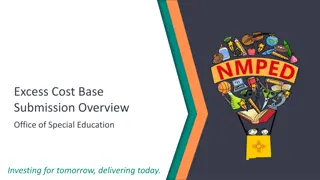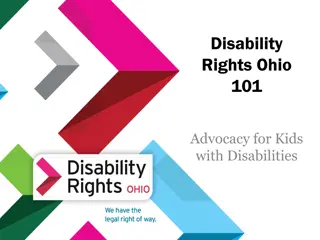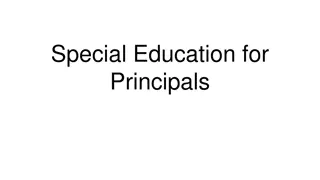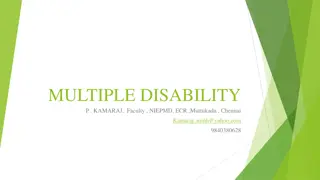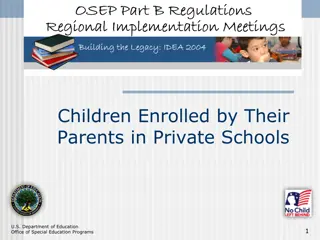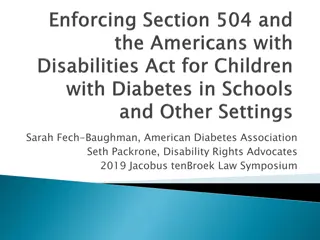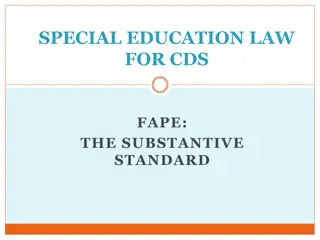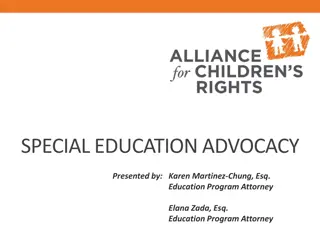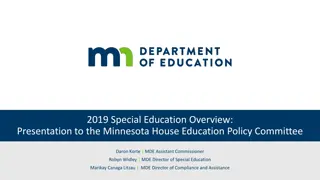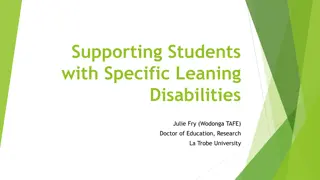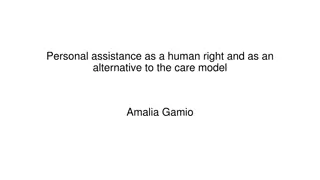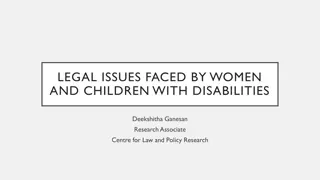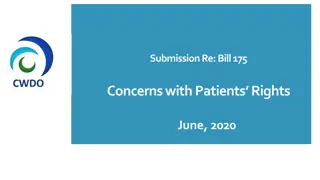Understanding Special Education Rights for Children with Disabilities
Explore the legal rights of special needs children in education through the expertise of Attorney Keith Howard, specializing in advocating for parents and children in North Carolina. Gain insights into key definitions, special education advocacy, laws, policies, and regulations, ensuring free and appropriate public education (FAPE) for all. Dive into the process of identification, evaluation, eligibility, and annual review to support children with qualifying disabilities like autism and deafness.
Download Presentation

Please find below an Image/Link to download the presentation.
The content on the website is provided AS IS for your information and personal use only. It may not be sold, licensed, or shared on other websites without obtaining consent from the author. Download presentation by click this link. If you encounter any issues during the download, it is possible that the publisher has removed the file from their server.
E N D
Presentation Transcript
THE EDUCATION RIGHTS OF SPECIAL NEEDS CHILDREN Attorney Keith Howard, Esq. The Law Offices of Keith L. Howard, PLLC 1-704-612-4151 We advocate for parents and children throughout the State of North Carolina!
AGENDA Keith Howard s Bio Special Education Questions
ABOUT ME! Former Education Law Professor 13 years of legal advocacy experience Social Justice Advocate Poverty Law Attorney Husband, father, and dedicated teacher and coach. Personal Motto: It s easier to build strong children than to repair broken men [and women]. Frederick Douglass
KEY DEFINITIONS Short-Term Suspension EOG/EOC Long-Term Suspension BIP FBA Expulsion Manifestation Determination Review Zero- Tolerance Policies IEP
SPECIAL EDUCATION ADVOCACY
LAWS, POLICIES, & REGULATIONS Individuals with Disabilities Education Act (IDEA) 20 U.S.C. 1400 et seq.; 34 CFR PART 300 Section 504 of the Rehabilitation Act 29 U.S.C. 794 Federal Education Rights and Privacy Act 20 U.S.C. 1232g; 34 CFR PART 99 NC Education of Children with Disabilities Article 9 of Chapter 115C NC Policies Governing Services for Children with Disabilities
FREE AND APPROPRIATE PUBLIC EDUCATION (FAPE) FAPE is one that Addresses the child's unique needs Is of equal quality as services provided to non-disabled students Meets state standards Follows IEP Provides opportunity to make progress toward goals in IEP Must confer educational benefit based on child s unique needs Must be provided regardless of whether school has it available or can afford it Must include personalized instruction with sufficient support services to permit child to benefit educationally from instruction Right to receive even while suspended
PROCESS Identification Evaluation Eligibility Annual Review Progress Monitoring IEP Re- Evaluation
IDENTIFICATION Qualifying Disabilities Autism Deaf-blindness Deafness Developmental delay Emotional disturbance Hearing impairment Intellectual disability Multiple disabilities Orthopedic impairment Other health impairment Specific learning disability Speech or language impairment Traumatic brain injury Visual impairment, including blindness Child with a Disability Has qualifying disability By reason thereof, needs special education and related services Child Find Schools are required to locate, identify, and evaluate all children with disabilities from birth through age 21
Disability Adverse Effect QUALIFYING FOR AN IEP Specially Designed Instruction RIGHT TO RECEIVE A FREE AND APPROPRIATE PUBLIC EDUCATION
QUALIFYING FOR 504 PLAN RIGHT TO RECEIVE FREE AND APPROPRIATE PUBLIC EDUCATION SIGNIFICANTLY IMPACTS MAJOR LIFE FUNCTION CAN SUE FOR MONETARY DAMAGES DISABILITY
EVALUATION School and/or parent may refer School must seek parental consent Must be conduct in all areas related to child s suspected disability or disabilities Within 90 days of receipt of a written referral Evaluations Eligibility determination IEP developed (for eligible child) Placement completed (for eligible child) Eligibility determined by parent and group of qualified professionals (typically IEP Team) Must be done at least every 3 years, unless school and parent agree not necessary If parent or eligible student disagrees, has right to free, independent educational evaluation
IEP TEAM Parents At least one regulation education teacher of the child At least one special education teacher of the child Representative of district who s Qualified to provide, or supervise the provision of, specially designed instruction to meet the unique needs of children with disabilities Knowledgeable about general education curriculum Knowledgeable about availability of resources of district Individual who can interpret instructional implications of evaluation results Other individuals who have knowledge or special expertise regarding the child E.g., psychologist, counselor, social worker, doctor, etc. Child (when appropriate)
INDIVIDUALIZED EDUCATION PROGRAM (IEP) Present levels of academic achievement and functional performance Measurable annual goals and how goals will be measured Special education and related services When begin, how often provided, where provided, and how long will last Accommodations Placement: Extent (if any) to which child will not participate with nondisabled children in regular class and other school activities Must be least restrictive environment (see next slide) Any modifications or exemptions from state- and district-wide tests Transition services (after child turns 14) Must be reviewed at least once/year
MEASURABLE IEP GOALS PLAAFP SMART It is through the PLAAFPs that you will Specific a) identify and prioritize the specific needs of the child Measurable Ambitious b) establish baseline level performance in relation to the general curriculum academic standards in order to develop an individualized and meaningful plan, and Attainable Realistic c) identify the degree of match between skills of the child and the instructional environment for the purpose of guiding decision making. Time-bound
LEAST RESTRICTIVE ENVIRONMENT (LRE) Students must be educated, to maximum extent possible, alongside non-special-education students Team decision Options: Separate: 39% w/ non-disabled peers Resource: 40-79% w/ non-disabled peers Regular: 80% w/ non-disabled peers Other Special schools Home instruction Instruction in hospitals and institutions
EXTENDED SCHOOL YEAR Whether the student regresses or may regress during extended breaks from instruction and cannot relearn the lost skills within a reasonable time; or Whether the benefits a student gains during the regular school year will be significantly jeopardized if he or she is not provided with an educational program during extended breaks from instruction; or Whether the student is demonstrating emerging critical skill acquisition ( window of opportunity ) that will be lost without the provision of an educational program during extended breaks from instruction.
SCHOOL-TO-PRISON PIPELINE: DEFINITION A system of laws, policies, and practices that pushes students out of schools and into the juvenile and criminal justice systems School-to-Prison Pipeline
MANIFESTATION DETERMINATION REVIEW (MDR) If child suspended facing > 10 school days in one school year, must be IEP Team meeting to determine if conduct was: 1) Caused by, or had a direct and substantial relationship to, the child s disability; or 2) Direct result of school s failure to implement the IEP If answer to either is yes, child can t be suspended Exceptions for drugs, weapons, and serious injury If answer to #1 is yes, school must: Conduct Functional Behavioral Assessment (FBA); and Create Behavioral Intervention Plan (BIP) If answer to both is no, child can be suspended, but must continue to receive FAPE
PROTECTIONS FOR STUDENTS NOT YET ELIGIBLE FOR SPECIAL EDUCATION Students who have not yet been identified as being eligible for special education may nonetheless assert school discipline-related protections under IDEA if the school had a basis of knowledge that the child was a child with a disability before the suspension occurred. Basis of knowledge = Parent/guardian expressed written concern that the child was a student with a disability in need of special education; Parent/guardian requested a special education evaluation; Teacher or other school staff expressed specific concerns about a pattern of behavior to the director of special education or other administrator; or Based on behavior and academic performance, clear and convincing
HANDLING DISPUTES Request all of your child s education records; Request independent education evaluations; Decide on filing a state complaint, OCR complaint, or due process petition.
RED FLAGS Procedural Substantive Dated Evaluations IEP not being implement Missing mandated evaluations Transition plan missing Home instruction Behaviors but no FBA and BIP Suspensions and removals Child find Native language rights not honored Predetermination Lack of toilet training IEP team composition Lack of implementation of related services
CONTACT INFORMATION Attorney Keith Howard The Law Offices of Keith L. Howard, Esq. Phone: 704-612-4151 Email: keithh@khowardlaw.com




